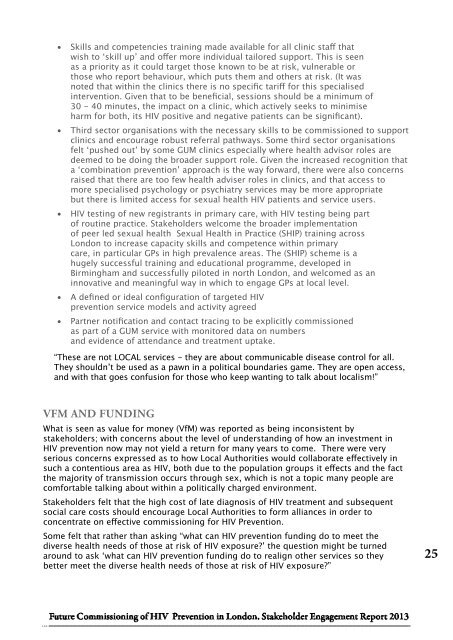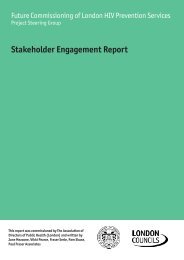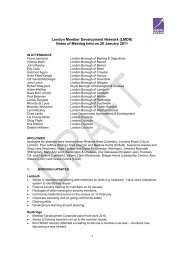Stakeholder Engagement Report - London Councils
Stakeholder Engagement Report - London Councils
Stakeholder Engagement Report - London Councils
You also want an ePaper? Increase the reach of your titles
YUMPU automatically turns print PDFs into web optimized ePapers that Google loves.
• Skills and competencies training made available for all clinic staff that<br />
wish to ‘skill up’ and offer more individual tailored support. This is seen<br />
as a priority as it could target those known to be at risk, vulnerable or<br />
those who report behaviour, which puts them and others at risk. (It was<br />
noted that within the clinics there is no specific tariff for this specialised<br />
intervention. Given that to be beneficial, sessions should be a minimum of<br />
30 - 40 minutes, the impact on a clinic, which actively seeks to minimise<br />
harm for both, its HIV positive and negative patients can be significant).<br />
• Third sector organisations with the necessary skills to be commissioned to support<br />
clinics and encourage robust referral pathways. Some third sector organisations<br />
felt ‘pushed out’ by some GUM clinics especially where health advisor roles are<br />
deemed to be doing the broader support role. Given the increased recognition that<br />
a ‘combination prevention’ approach is the way forward, there were also concerns<br />
raised that there are too few health adviser roles in clinics, and that access to<br />
more specialised psychology or psychiatry services may be more appropriate<br />
but there is limited access for sexual health HIV patients and service users.<br />
• HIV testing of new registrants in primary care, with HIV testing being part<br />
of routine practice. <strong>Stakeholder</strong>s welcome the broader implementation<br />
of peer led sexual health Sexual Health in Practice (SHIP) training across<br />
<strong>London</strong> to increase capacity skills and competence within primary<br />
care, in particular GPs in high prevalence areas. The (SHIP) scheme is a<br />
hugely successful training and educational programme, developed in<br />
Birmingham and successfully piloted in north <strong>London</strong>, and welcomed as an<br />
innovative and meaningful way in which to engage GPs at local level.<br />
• A defined or ideal configuration of targeted HIV<br />
prevention service models and activity agreed<br />
• Partner notification and contact tracing to be explicitly commissioned<br />
as part of a GUM service with monitored data on numbers<br />
and evidence of attendance and treatment uptake.<br />
“These are not LOCAL services - they are about communicable disease control for all.<br />
They shouldn’t be used as a pawn in a political boundaries game. They are open access,<br />
and with that goes confusion for those who keep wanting to talk about localism!”<br />
VFM and Funding<br />
What is seen as value for money (VfM) was reported as being inconsistent by<br />
stakeholders; with concerns about the level of understanding of how an investment in<br />
HIV prevention now may not yield a return for many years to come. There were very<br />
serious concerns expressed as to how Local Authorities would collaborate effectively in<br />
such a contentious area as HIV, both due to the population groups it effects and the fact<br />
the majority of transmission occurs through sex, which is not a topic many people are<br />
comfortable talking about within a politically charged environment.<br />
<strong>Stakeholder</strong>s felt that the high cost of late diagnosis of HIV treatment and subsequent<br />
social care costs should encourage Local Authorities to form alliances in order to<br />
concentrate on effective commissioning for HIV Prevention.<br />
Some felt that rather than asking “what can HIV prevention funding do to meet the<br />
diverse health needs of those at risk of HIV exposure?’ the question might be turned<br />
around to ask ‘what can HIV prevention funding do to realign other services so they<br />
better meet the diverse health needs of those at risk of HIV exposure?”<br />
25




